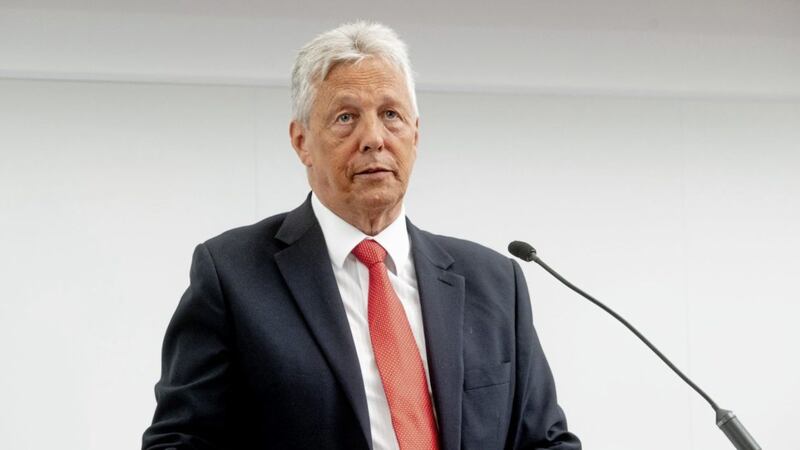The sea border grace period deadlines at the end of September for food and the end of December for medicines have been swept away by London, with the acceptance of Brussels.
The protocol is now an indefinite process, a concept with which Northern Ireland is familiar. It could run for years without encountering a cliff edge high enough for the brinkmanship the DUP believes it needs to reverse its political fortunes.
So the DUP has created a new deadline: October is “the sort of timescale we’re working to” for contemplating departure from the executive, according to party leader Jeffrey Donaldson. Speaking to Radio Ulster, he connected this directly to the government’s deadline for Irish language legislation.
Three months ago, secretary of state Brandon Lewis promised Westminster will pass that legislation in October if Stormont fails to do so. This deal was struck over the DUP’s head after Sinn Féin warned it would not otherwise re-nominate a deputy first minister to serve with new first minister, Paul Givan.
Edwin Poots was in such a rush to pin the deal down he spooked his own party and was promptly replaced by Donaldson.
New Decade, New Approach (NDNA) commits all Stormont parties to passing language legislation. NDNA also contains a government commitment to all parties to “legislate to guarantee unfettered access for Northern Ireland’s businesses to the whole of the UK internal market, and ensure that this legislation is in force for 1 January 2021.”
Donaldson’s new deadline argument is that if the government is going to pass a language law for republicans, which NDNA did not even require Westminster to do, it had better pass the NDNA sea border law for unionists. The January 1 date gives him flexibility to string the threat out, or more probably to let it fade away.
This elaborate whataboutery has all the hallmarks of a “clever device”, the phrase Peter Robinson used in 2010 when promising he had a plan if the devolution of policing and justice went wrong. Donaldson has brought Robinson back into DUP headquarters to review party structures.
There is no chance of Stormont passing or even seriously commencing language legislation in the next two weeks, so Lewis has been cornered into either putting it through Westminster and risking a DUP walkout or not putting it through and risking a Sinn Féin walkout.
On paper, this strengthens the DUP’s position. The worst outcome from its perspective would be no sea border law, Sinn Féin walking out, Westminster passing language legislation to get Sinn Féin back, followed by an election. That might still look better than heading into an election with no win on the protocol and language legislation still on the executive’s hands.
In reality, a large swathe of the unionist electorate is bound to find this too clever by half. Collapsing devolution is a vote-winner only in the Felons Club or the top of Jamie Bryson’s wheelie bin. Merely causing an early election - all Donaldson is actually threatening - would be unpopular enough, especially during a health crisis.
The NDNA law Lewis needs to rush through Westminster is the provision to stop Stormont collapsing for six months if one of the two main executive parties quits. This law was close to completion when parliament broke up in late July and really could be passed in the next two weeks. A line that stops it coming into effect for two months could easily be dropped. The government and the Northern Ireland Office must be pressed on why this is not an urgent priority.
No doubt every outworking of the clever device has been gamed through at DUP headquarters but it should be seen alongside a more straightforward strategy of hardline posturing to get back ahead in the polls - or more correctly in the one poll, as LucidTalk provides the only regular, affordable polling in Northern Ireland.
The DUP needs to reclaim three percentage points back from the TUV to eclipse the UUP and be the highest-polling unionist party again. Given the margin of error, it may only need to reclaim one per cent: just 18 respondents accounted for that swing in the most recent LucidTalk poll.
Then Donaldson can tell unionist voters to rally behind his party, as it alone can beat Sinn Féin and keep the first minister’s post. His media interviews this week have been warming up that theme.
But if that device still worked, why has the unionist vote been spreading across multiple parties in the first place?








